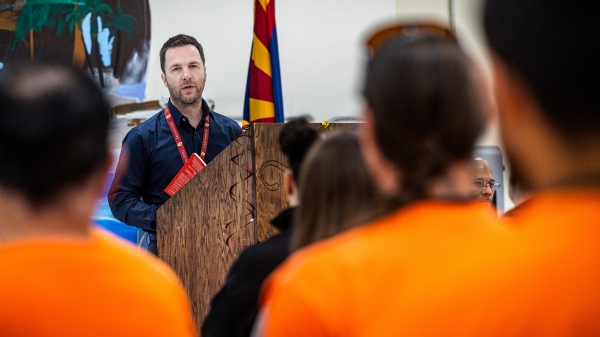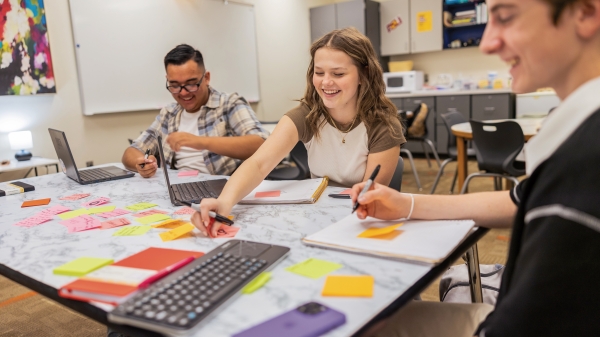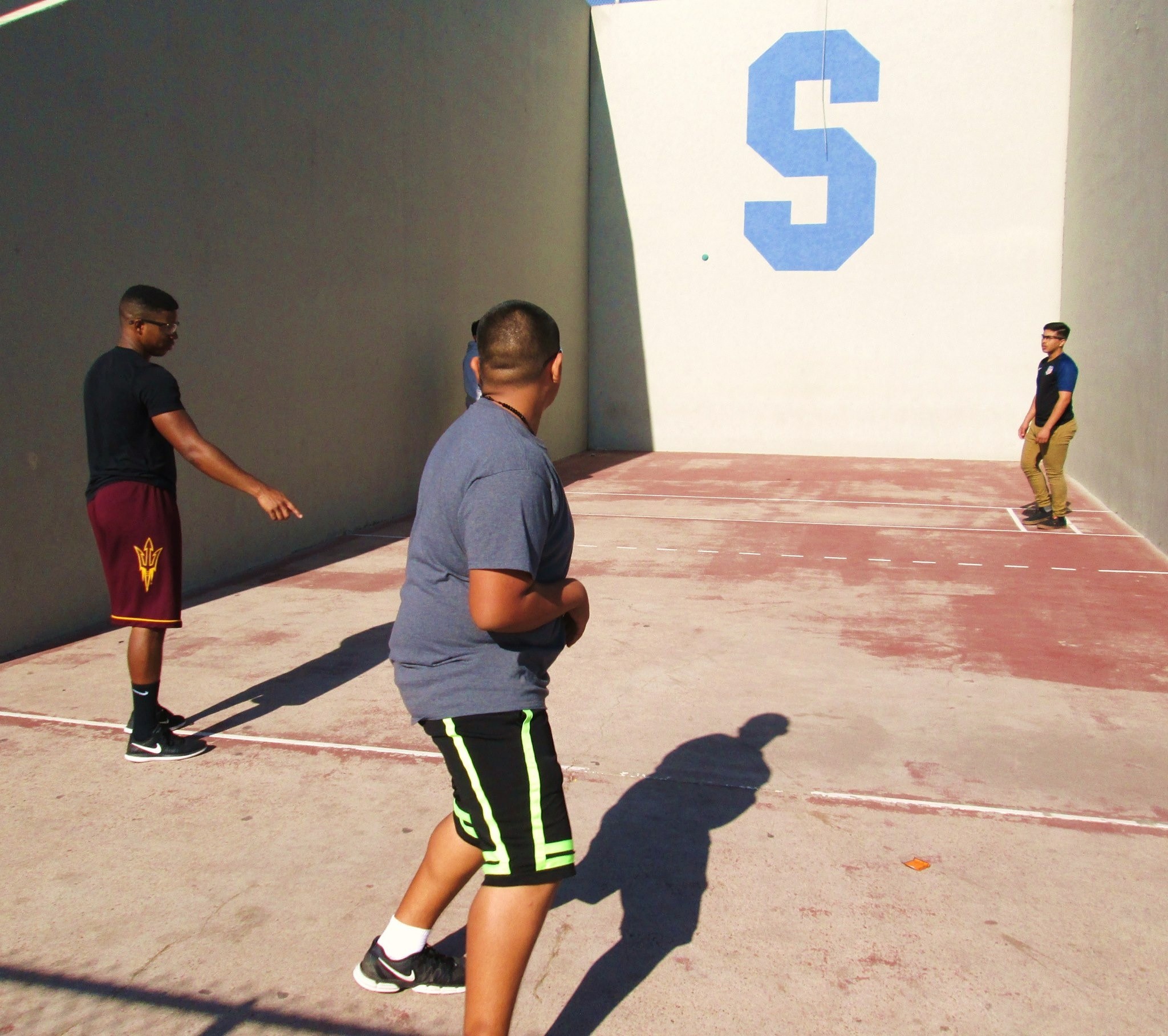The grants are small, but the impact is big.
A program that gives awards of $1,500 or less to Arizona State University student-led service projects is being nationally recognized for its success in only its third year.
This year, more than $21,000 was awarded to 19 student projects that are impacting hundreds of people in the Phoenix area, including refugees, high school students, homeless families, recovering addicts, prisoners and elementary schoolchildren who need books. The students are helping those in need through art, tutoring, sports, health education, yoga, literature, hiking and gardening.
“It offers such a unique opportunity for students to really create the change they want to see in the community,” said Lindsay Dusard, who won two grants in previous years and is now the student chair of the Woodside Community Action Grant program. The initiative has been named the “service program of the year” by the IMPACTDusard and others in the program left Feb. 16 for the national conference in St. Louis to accept the award. Conference, a national group of student leaders, administrators, faculty and nonprofit groups that engage college students in socially responsible work.
Woodside, like all programs that are part of Changemaker Central @ ASU, is run by students, who promote the competition, supervise the application process, judge the applications and administer the grants, with the help of a staff adviser. Dusard runs the program with Lindsay Zapata, a Woodside student intern.
Student winners are able to make a big impact with small amounts.
“The reasons these projects can happen is that the students dedicate their time and labor, and it’s a lot of work,” Dusard said. “And we encourage them to go out and seek more donations, for supplies or whatever, and they also work with their organizations to extend the money as far as they can to make the greatest impact.”
The program is funded by the Woodside Community Embeddedness Endowment held by the ASU Foundation. The endowment was established in 2000 by Migs Woodside and her late husband, Bill Woodside, to support faculty or student organizations making meaningful impact in the community. Over the years the endowment has grown significantly because of additional donations from Migs Woodside and attendees of the Woodside Lecture Series, which featured ASU faculty members speaking to members of the community.
Migs Woodside said: “In gratitude to ASU's stellar faculty for presenting 16 years of seminars for the Woodside Lecture Series, our community is pleased to give funds to students to develop service projects and improve the lives of others. We hope the Woodside Community Action Grants will encourage students to continue their volunteer efforts and take on leadership roles in future. We are excited and impressed by the outstanding success of this program and its recognition in just three years by a national organization.”
Members of Students Organize for Syria, an ASU student organization, took children of Syrian refugee families hiking recently. The club won a Woodside Community Action Grant for its outreach program. Contributed photo
After the Changemaker students make their recommendations for fundable projects, a committee of donors to the Woodside Endowment make the final determination on the amounts awarded. The 19 winners this year were chosen from 39 applications.
“A lot of the students have already volunteered extensively in the community they are applying to serve, so they have a good feel for the community needs, and they have to prove that in their application,” Dusard said.
Some of the projects have won in consecutive years, including Iron City Magazine, a journal devoted to writing and art from the prisoner world, and Designing Micro Air Vehicles, a hands-on engineering venture for minority high school students.
New this year is a series of monthly workshops for the winners, according to Jasmine Smalls, program coordinator at Changemaker Central and the staff adviser for Woodside.
“In the past, the feedback we received that the entire semester can go by and we would never know the progress of a project,” she said. “Now, the students are working on professional development workshops on topics such as e-portfolios, so they can tell their stories and the impact they’re making on the local community.”
Dusard’s two grants funded a project with the Peace Corps Club in which members gathered corps alumni and current students to work on a garden for refugee families, and a summer recreation program for refugee children that she established as part of her thesis for Barrett, the Honors College.
“It was important for the social and emotional development of these children who have experienced high levels of trauma and are forced to integrate quickly into a classroom,” said Dusard, a senior majoring in marketing and public programs and public policy in the W. P. Carey School of Business.
Helping refugees has been the focus of several projects over the three years. One winner this year is Ainsley Pfeiffer, a member of Students Organize for Syria, which won a $1,200 grant for its tutoring and outreach program. The group works with children of Syrian refugee families, giving homework help and boosting their English skills, but the members realized that the kids needed to get out more. The grant will pay for trips to museums and the zoo and recreational activities such as bowling and picnics. On Feb. 12, the group took several children hiking at South Mountain.
“Usually on the weekend, the kids stay at home and they haven’t seen much of Arizona or even of American culture, so we thought it would be fun to take them out,” said Pfeiffer, a senior anthropology major.
Over the course of many months, Pfeiffer and the club members have bonded with the families.
“When we drop off the kids, they invite us in for dinner, and we’ve built some great relationships,” she said. “I didn’t know any refugee families before this, and I see that they have a lot of resilience because they don’t speak English, but they still go out and get jobs and maneuver American society pretty well.”
Many of the Woodside projects reach out to children and teenagers. The Sun Devil Handball Club was awarded $750 for its Homework and Handball program in which club members visit high schools in Phoenix, play with the students and then talk to them about college.
The Sun Devil Handball Club won a Woodside Community Action Grant for its outreach program to Phoenix high schools. Contributed photo
Derek Doyle, president of the handball club, said the members came up with the service idea last fall, and it was a natural fit for some of the Phoenix high schools because they already had courts and many students play during lunch time.
The grant money will be spent on equipment, including several dozen pairs of eye guards that the teens can use. At a typical outreach, the club will set up a bracketed tournament for the high school players, and after the games the club members will chat with them and encourage them to consider applying to college. Many of the high schoolers don’t come from college-going families.
“A lot of them think it’s too expensive or too hard. We’ll talk about how there are scholarships and financial aid. We tell them if they put in the effort during high school, they can realize college is an option,” said Doyle, who is a sophomore sports and media studies major in the W. P. Carey School of Business.
Forging that connection with the handball clubThe service project was one reason the Sun Devil Handball Club was recently named the “organization of the year” by the U.S. Handball Association. is another incentive for the young students.
“When a student gets into a club at college, they feel more welcome, and the kids realize there’s a team that’s already here that they can be a part of,” he said.
For a list of all the student projects that won Woodside Community Action Grants, click here.
Top photo: Book Buddy received $750 to help children who are English language learners in the third and fourth grade at Kyrene de las Manitas Elementary in Tempe, by giving them a reading resource that will help them improve their English language skills.
More Arts, humanities and education

ASU professor, Arizona inmate work to rehabilitate the 'imprisoned mind'
An Arizona State University professor has collaborated with an Arizona inmate on a book that examines why investing in healing prisoners would benefit everyone.“Imprisoned Minds: Lost Boys, Trapped…
Illuminating legacy at ASU
In 2020, the ASU Art Museum unveiled a groundbreaking installation, "Point Cloud (ASU)," by renowned artist Leo Villareal. The art piece was given a permanent home on the Tempe campus in 2024 thanks…

Name change for ASU's Mary Lou Fulton Teachers College reflects college's mission
Arizona State University’s Mary Lou Fulton Teachers College has a new name: the Mary Lou Fulton College for Teaching and Learning Innovation.The name change, which will be completed in time for the…




